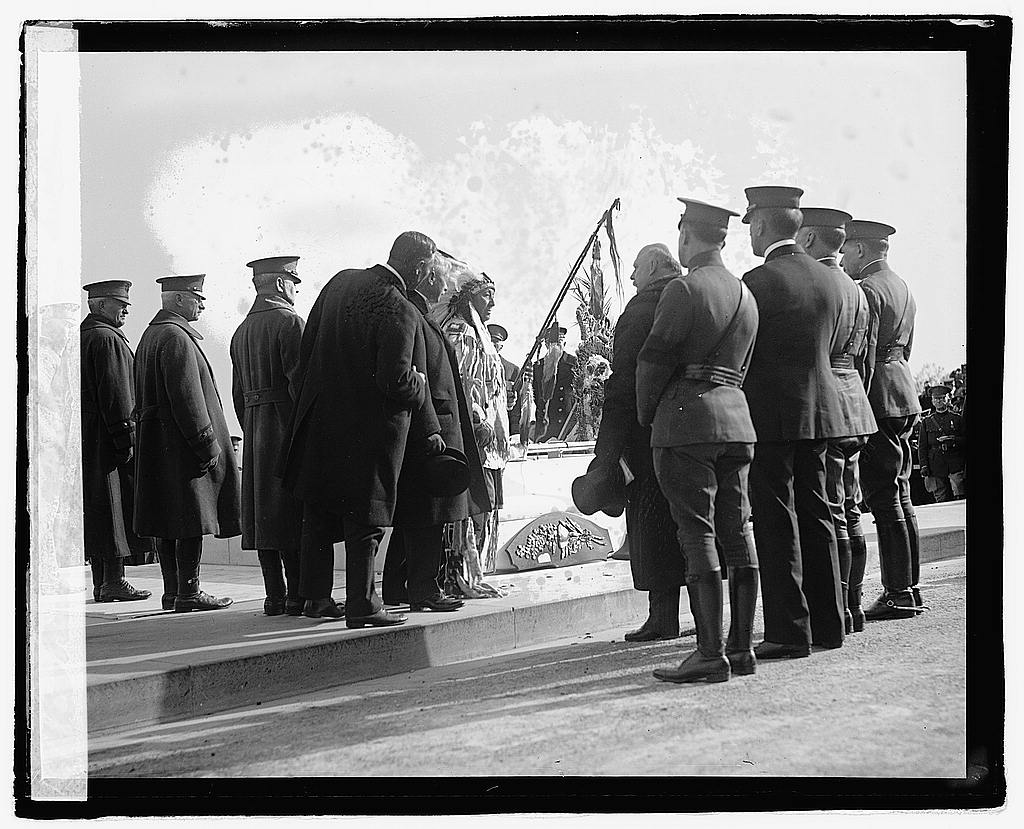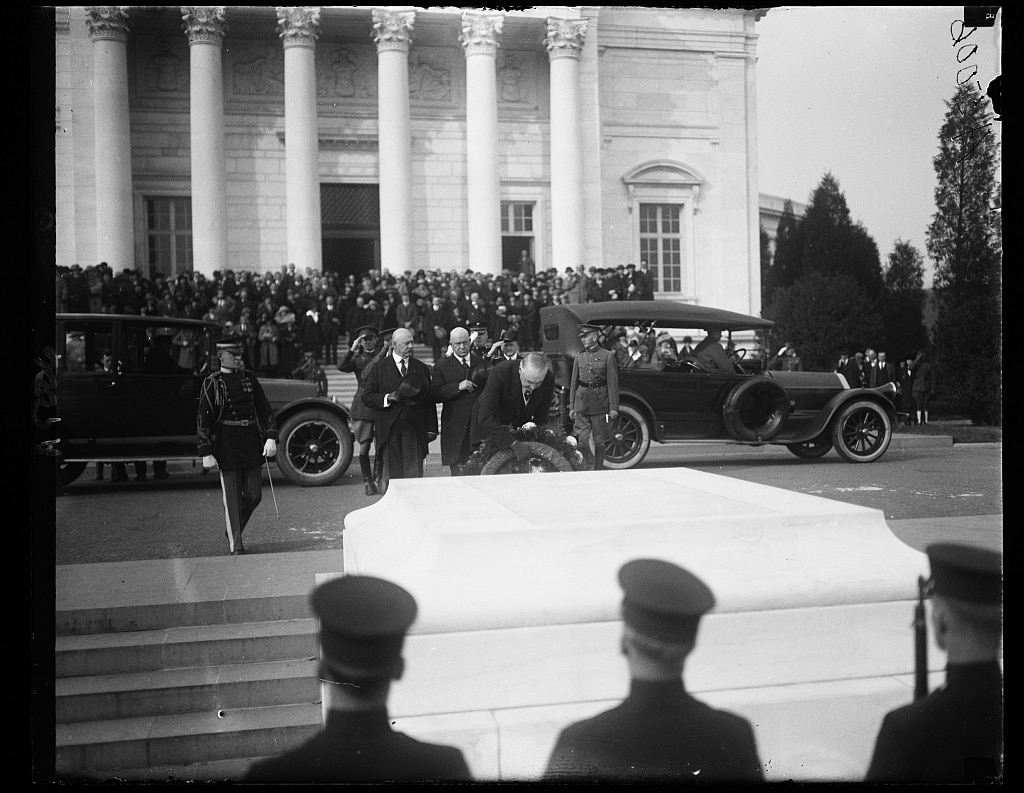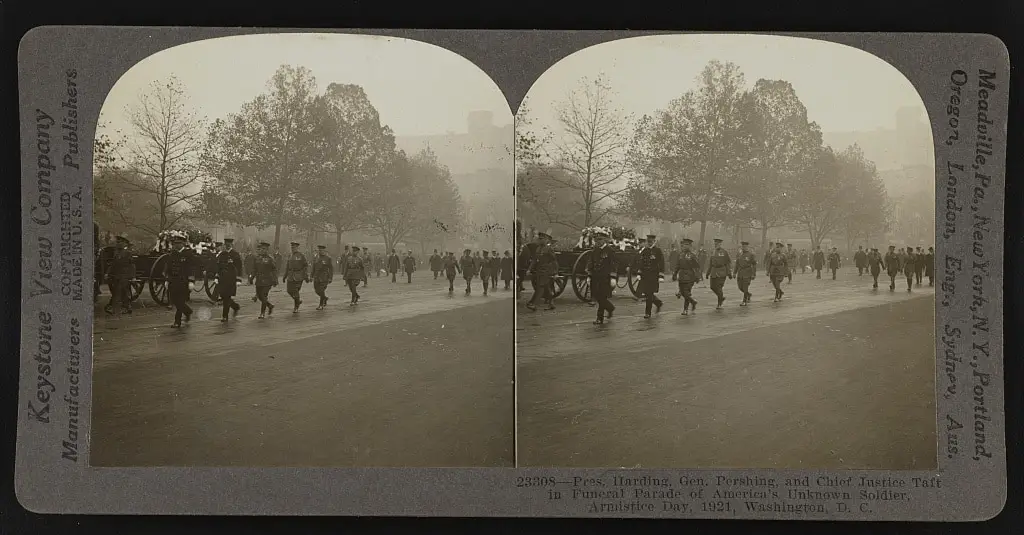One hundred years ago a solemn procession made its way from the US Capitol, past the various National monuments, and across Memorial Bridge into Arlington National Cemetery. The five-mile funeral procession included various national leaders, including President of the United States Warren G. Harding and General John J. “Black Jack” Pershing who commanded the American expeditionary Forces on the Western front during World War I. General Pershing, out of respect for the more than 117,000 US troops killed in action, walked the entire five-mile route to the sacred gravesite that has become the heart of the cemetery.
A horse-drawn cart with a flag-draped coffin led the procession, carrying the remains of a fallen U.S. Soldier whose identity, now one hundred years later, is still known only to God. As the procession arrived at its hallowed site, national and international leaders placed various tokens of honor and respect on top of the casket. President Harding solemnly laid on it the Congressional Medal of Honor, the United States government’s highest and most prestigious military decoration for acts of valor. The principal chief of the Crow Indian Nation reverently took off his feather war bonnet and placed it on top of the casket out of respect for the fallen, unknown warrior.
On that cold November day, at exactly eleven minutes after eleven o’clock, the large crowd of almost five thousand mourners observed two minutes of prayerful silence. President Harding then delivered a stirring address, reflecting on the service, valor and sacrifice of our nation’s veterans, especially those who, like the unknown soldier, gave their full measure of devotion to duty.

President Harding’s words that day regarding the unknown soldier honors all veterans, “We do not know the eminence of his birth, but we do know the glory of his death. He died for his country, and greater devotion hath no man than this. He died unquestioning, uncomplaining, with faith in his heart and hope on his lips, that his country should triumph and its civilization survive.” He then challenged those gathered to pray that Armistice Day of 1921—the day that the nation dedicated the Tomb of the Unknown Soldier—would “mark the beginning of a new and lasting era of peace on earth, good will among men.” President Harding concluded his remarks by leading the audience in the Lord’s Prayer.
In 1954, Congress changed the word “Armistice” to “Veterans” to make the holiday a day to honor all veterans. Today our troops remain engaged in military operations around the world. Our all-volunteer military has, until the last several months, been deployed in combat in Southwest Asia for the longest period in US history, twenty straight years since the 9/11 terrorist attacks. However, combat operations in Afghanistan officially ended on August 30 when the last manned military aircraft lifted off from the international airport in Kabul to finally bring our troops home from that war-torn land.

Let us give thanks to God on Veterans Day 2021 that our troops are spending this national holiday at home with their friends, their families and in their local places of worship. Today we salute our veterans for their selfless and sacrificial service as the guardians of our nation’s many freedoms, including life, liberty and the pursuit of happiness.
President Harding’s words at the Tomb of the Unknown Solider one hundred years ago ring true today as we observe Veterans Day 2021, “Our thoughts today alternate between defenders living and defenders dead. A grateful Republic will be worthy of them both. Our part is to atone for the losses of our heroic dead by making a better Republic for the living.”
“Happy are those who work for peace; God will call them his children!” (Matthew 5:9, GNT)
This article was written by Doug Carver, NAMB Executive Director of the Chaplaincy. It was published on namb.net.

